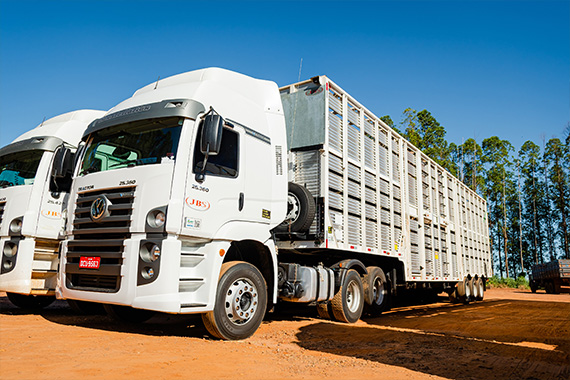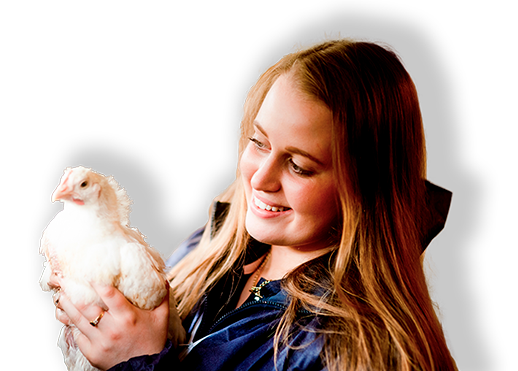Transportation
As a component of our animal welfare programs at each production facility, animals are transported in company or third-party vehicles designed to ensure animal well-being.
Proper transportation avoids injuries and minimizes animal stress during transit, loading, and unloading. Where applicable, we have specified maximum transportation distances and transit times, and procedures for resting, feeding, and watering at defined intervals. We are also constantly investing to improve and modernize animal transport vehicles, as well as to renew our own fleets, with the objective of increasing the safety and comfort of animals during transportation.
Livestock transporters are audited daily to verify adherence to JBS USA humane handling standards, and depending on the country, PAACO/NAMI Transportation Guidelines, CFIA Humane Transport Guidelines, Australian Welfare Standards and Guidelines – Land Transport of Livestock and RSPCA, Red Tractor or QMS.

Our Regional Approaches:
Australia:
Transportation to our Australian beef, lamb and pork facilities is in line with the Australian Animal Welfare Standards and Guidelines - Land Transport of Livestock. This legislation...
Australia:
Transportation to our Australian beef, lamb and pork facilities is in line with the Australian Animal Welfare Standards and Guidelines - Land Transport of Livestock. This legislation does not outline specific requirements for the duration of transport but requires that considerations must be provided for: class and condition of livestock; weather and road conditions; planned rest and spell stops; and time off feed and water.
At Huon, we have internally developed rules for the water quality conditions in which fish are transported. We also manage stocking densities carefully for transport and truck drivers monitor dissolved oxygen continuously to maintain suitable levels during transport. We meet RSPCA standards for fish transport and are externally audited to demonstrate compliance with transport standards.
Brazil:
At Seara, specified maximum distances or transit times between farms and processing facilities help to ensure animal comfort. Vehicles are routed to achieve an optimal combination...
Brazil:
At Seara, specified maximum distances or transit times between farms and processing facilities help to ensure animal comfort. Vehicles are routed to achieve an optimal combination of distance, transit time and vehicle speed. The average distances between our farms and processing facilities are 56 km for poultry and 61 km for pigs.
Friboi has controls and targets in place to source animals from farms close to our strategically located processing facilities. On average, they distance 222 km apart with an average transport time of 6.5 hours. In 2023, 73% of trips were less than 8 hours. Livestock drivers are required to sign a statement similar to the one signed by personnel at processing facilities, confirming they are familiar with our Animal Welfare Policy. For third-party truck drivers, Friboi incorporates animal welfare guidelines into their service agreements.
Canada:
Our Canadian beef production facility requires all transporters to present documentation that demonstrates their understanding of and adherence to JBS guidelines and certification...
Canada:
Our Canadian beef production facility requires all transporters to present documentation that demonstrates their understanding of and adherence to JBS guidelines and certification with Canadian Livestock Transportation (CLT). Improper handling of livestock results in immediate corrective actions and can result in the transporter being permanently banned from delivering livestock to our facility in the future.
Europe:
The Pilgrim’s Europe Chicken business avoids transporting birds over long distances, with the majority of our farms being located within a 30-mile radius of our fresh processing facilities. When chickens are transported...
Europe:
The Pilgrim’s Europe Chicken business avoids transporting birds over long distances, with the majority of our farms located within a 30-mile radius of our fresh processing facilities. When chickens are transported during cold weather, we add side and front panels to the transport cages to keep chickens warm. During the summer months, we reduce the number of chickens per cage and keep them cool and minimize heat stress with shade, fans, and misters. We work to minimize the amount of time chickens spend in cages, consistent with regionally appropriate animal welfare practices. We also monitor handling and transportation animal welfare metrics of our chickens.
Our Pilgrim’s Europe pork and lamb production facilities require that livestock are moved in their social groups, and hog trailers are equipped with lifting decks to make loading as stress free as possible. Trailers are bedded with straw and in the summer months extra drinking water is provided. We monitor transport time with average journey times of 3.8 and 2.9 hours for hogs and lambs, respectively. Our position is that no animal should be in transit to a Pilgrim’s Europe Pork production facility for longer than eight hours.
Mexico:
When Pilgrim’s Mexico chickens are transported during cold weather, we add side and front panels to the transport cages to keep chickens warm. During the summer months, we reduce...
Mexico:
When Pilgrim’s Mexico chickens are transported during cold weather, we add side and front panels to the transport cages to keep chickens warm. During the summer months, we reduce the number of chickens per cage and keep them cool and minimize heat stress with shade, fans, and misters. We work to minimize the amount of time chickens spend in cages, consistent with regionally appropriate animal welfare practices. We also monitor handling and transportation animal welfare metrics of our chickens.
United States:
Our U.S. beef and pork production facilities require all transporters to present documentation that demonstrates their understanding of and adherence to JBS guidelines and certification...
United States:
Our U.S. beef and pork production facilities require all transporters to present documentation that demonstrates their understanding of and adherence to JBS guidelines and certification with Beef Quality Assurance Transportation (BQAT) and the National Pork Board’s Transport Quality Assurance (TQA) programs, as applicable. Improper handling of livestock results in immediate corrective actions and can result in the transporter being permanently banned from delivering livestock to our facilities in the future.
When Pilgrim’s U.S. chickens are transported during cold weather, we add side and front panels to the transport cages to keep chickens warm. During the summer months, we reduce the number of chickens per cage and keep them cool and minimize heat stress with shade, fans, and misters. We work to minimize the amount of time chickens spend in cages, consistent with regionally appropriate animal welfare practices. We also monitor handling and transportation animal welfare metrics of our chickens.
Our JBS USA Carriers business is responsible for providing safe transportation to more than 1.5 million cattle each year. Delivering cattle in a manner that promotes humane handling during loading at the feedyard, a safe journey for both drivers and animals, and minimal stress on cattle during unloading at our facilities is our priority. Team training is based on the BQAT program, which is widely recognized as the industry standard for truck driver training.
JBS USA Carriers, in conjunction with Five Rivers Cattle Feeding (JBS USA’s largest producer partner) animal welfare teams, provides drivers with animal-handling and safety training. The training materials are based on the BQAT program, which is widely recognized as the industry standard for truck driver training in the United States.

